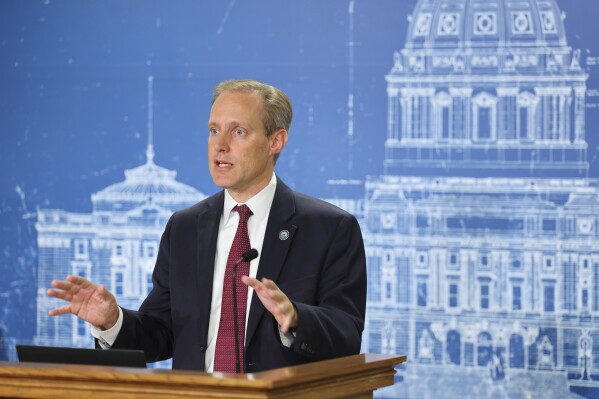Your support helps us to tell the story
Support NowOur mission is to deliver unbiased, fact-based reporting that holds power to account and exposes the truth.
Whether $5 or $50, every contribution counts.
Support us to deliver journalism without an agenda.

Louise Thomas
Editor
Moves by the chancellor to soften a proposed crackdown on people living in the UK with non-dom status have been backed by academics and tax experts, who say the changes are “sensible and pragmatic”.
Rachel Reeves is considering rowing back on Labour’s manifesto promise to scrap concessions after former chancellor Jeremy Hunt announced plans to abolish the tax status.
There are fears that tightening up Mr Hunt’s proposed changes to the non-dom regime could see wealthy foreigners leave the country, lowering the tax take overall.
Non-dom status lets those who live in the UK but are not permanently settled avoid paying tax on overseas income.
In March’s spring Budget, Mr Hunt announced an overhaul of the system, replacing it with a foreign income and gains regime (FIG) that will still let individuals who come to the UK avoid paying UK tax on overseas earnings, but only for four years.
Labour figures at the time vowed to replace the Tories’ “semi-skimmed” plan with a “full-fat” one. Its general election manifesto promised to end the use of offshore trusts to avoid inheritance tax and to remove a discount for those bringing foreign income into the UK in 2025-26, with the measures set to raise £1bn in their first year.
But a Treasury source confirmed discussions are ongoing between the Treasury and Office for Budget Responsibility (OBR) about which measures would be announced in next month’s Budget.

It came after officials told The Financial Times the government would not “press on regardless” if the changes would cost more than they raise due to non-doms leaving the country en masse.
Arun Advani, director of the Centre for the Analysis of Taxation and an associate professor of economics at the University of Warwick, said plans to water down some of the measures appeared “sensible and pragmatic”.
He told The Independent that a current cliff-edge in the proposals, which would see current non-doms paying inheritance tax in full after 10 years in the UK, should be eased so that the rate increases gradually. A gradual introduction would blunt the impact of the changes on those who have been in the UK for nine years and might consider leaving.
And he said measures to clamp down on the use of offshore trusts should come with an “unwinding provision”, as many of those with non-dom status put money in offshore trusts after then-chancellor George Osborne’s reforms exempted them in 2015.
“The obvious thing to do would be to let people who walked themselves into one of these walk back out, as it was not their fault, they were told to do so,” he said.
Currently, those looking to unwind offshore trusts would be liable for a tax charge to come out of them.

Prof Advani said: “Letting people out is very sensible and pragmatic, the provision was never meant to make people worse off than natives. Those are the kinds of areas they could adjust, those things would make the overall reform better and fairer.
“Fairness is not about squeezing people, it is about having a principled, fair system that would say, ‘We are not trying to give everything away, but we are also not trying to completely squeeze them’.”
Rachel de Souza, a tax partner at RSM, said it’s “really good news” that the Treasury is considering adjusting its plans.
She called on Ms Reeves and Treasury officials to clarify their intentions to avoid wealthy non-doms leaving the UK before the Budget on 30 October.
Ms de Souza added that Labour’s current manifesto plans give people “no incentive to remain in the UK”, and called for the government to make some concessions with any changes.
She said “the best news non-dom residents could receive” is revising whether offshore trusts are brought into the inheritance tax net.
Ms de Souza said: “The slight difficulty is that some of the super wealthy have already gone. They have been through that emotional thought process to go, and I doubt they’ll be rushing back.”
The non-dom tax loophole was thrust into the spotlight when The Independent first revealed that Akshata Murty, Rishi Sunak’s wife, had used it to save potentially millions of pounds.
Ms Murty, whose family business is estimated to be worth around £60bn, later said she would no longer claim the status on her worldwide earnings. At the time, she said she did not want her tax status to be a “distraction for my husband or to affect my family”.
The government is also considering a “tap tax”, which would see those with large gardens or swimming pools paying higher water bills.
Water regulator Ofwat has suggested charging a premium for those with hot tubs, swimming pools and large sprinkler systems.
The Daily Mail reported ministers are now considering similar proposals, with hopes that any extra money raised could be used to cut bills for the poorest households.
A Treasury spokesperson said: “These reports are speculation, not government policy. The independent Office for Budget Responsibility will certify the costings of all measures announced at the Budget in the usual way.
“We are committed to addressing unfairness in the tax system so we can raise the revenue to rebuild our public services. That is why we are removing the outdated non-dom tax regime and replacing it with a new internationally competitive residence-based regime focused on attracting the best talent and investment to the UK.”
Disclaimer: The copyright of this article belongs to the original author. Reposting this article is solely for the purpose of information dissemination and does not constitute any investment advice. If there is any infringement, please contact us immediately. We will make corrections or deletions as necessary. Thank you.



